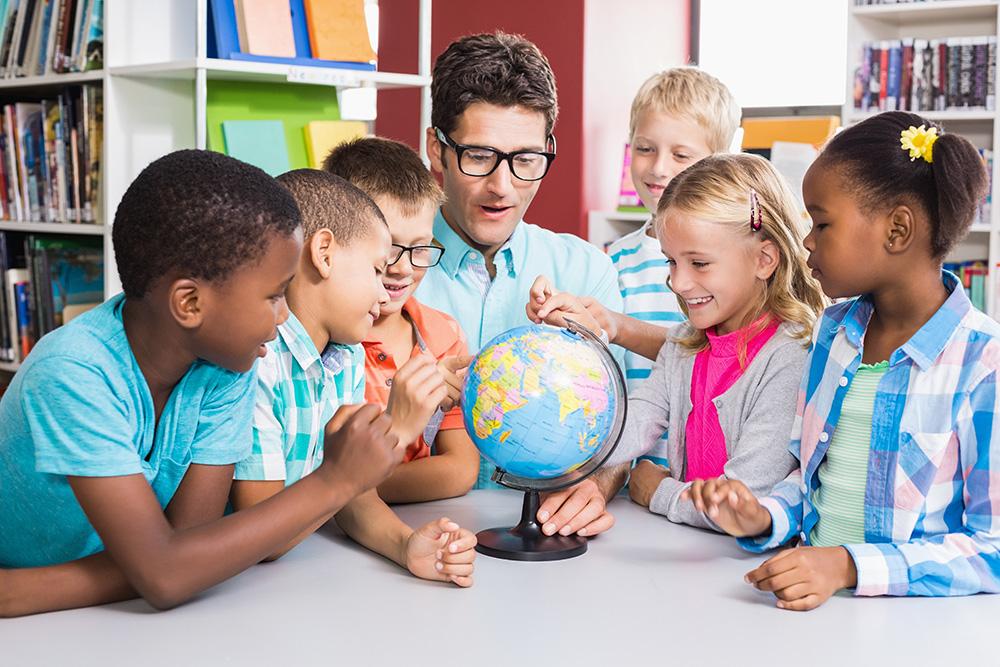
FS-2024-0714 | April 2025
Global Citizenship Education in 4-H: A Guide for 4-H Professionals
By Anna Glenn, Joseph Cho, and Jeff Howard
When you think of Global Citizenship what do you think of? Airports? Passports? Suitcases?

For many, the idea of Global Citizenship is associated with traveling, packing your bags, getting on a plane and physically going somewhere. However, to be a global citizen, you do not necessarily have to leave the country you live in.
Global Citizenship is more of a mindset or collective set of skills than a certain set of activities. A global citizen is someone whose perspective of the world is open, someone who is not only aware of but also curious and respectful of the rich diversity that exists beyond themselves, and someone who recognizes their place in the world and their connections and responsibility to others (UNESCO, 2024).
Examples of actions that global citizens might take include:
- Developing an awareness of bias internally and externally
- Understanding global connections between people and nations
- Listening and accepting different perspectives
- Learning about other cultures or audiences different than your own
- Stand up for the wellbeing of different communities
What is Global Citizenship Education?

In a world that is becoming increasingly more globalized, diverse, and connected, global citizenship is quickly becoming a vital skill for today’s workforce and community members (Estellés & Fischman, 2021). While striving to grow the leaders of tomorrow, it is the responsibility of 4-H professionals to make sure that this concept is integrated into our current programming. Youth who engage in cultural exchange programs often develop a greater respect and appreciation for cultures different than their own (Arnold, 2004). However, as with any new skill or mindset, it takes training and then intentional effort by educators and caregivers to create and expose young people to new experiences that will enable them to learn, reflect, and grow in this area (Kolb, 1984; Rapoport, 2010). A clearer understanding of and a focus on Global Citizenship Education (GCE) is therefore needed among 4-H youth development professionals, as well as volunteers and parents.
GCE can be defined as any experience that challenges students’ current understanding or perspective, helps them to feel a sense of connection or belonging to the world at large, and encourages them to think more broadly about a certain topic or societal problem while finding ways to get involved (Sherman, 2019; UNESCO, 2023).
While GCE certainly includes experiences like study abroad and exchange programs where students physically leave the context of their own homes, there are many other ways that parents, guardians, caregivers, volunteers, and educators can help foster global citizenship right here at home.
Some examples of GCE programs that can be locally implemented include:
- A service project with a global focus
- A summer program or craft night with a global theme
- A global career day with a focus on connections to people or issues abroad
- A lesson about soil science that incorporates a few additional questions that challenge young people to think about soils and their impact outside of their local environment
- Exposure to digital media from different sources and places
While some might be concerned about the complexity, cost, or background knowledge needed to incorporate Global Citizenship Education, at its core, GCE is simply about developing knowledge, building skills, and shaping attitudes and awareness in order to develop global competencies, something that many 4-H professionals are already actively doing. 4-H professionals do not necessarily need to plan any big trips, have personal experience traveling abroad themselves, or extensive knowledge of other cultures, they merely need to be open to exploring new ideas, cultures, and perspectives alongside their 4-H community members.
Global Citizenship Benefits

As the focus and interest in Global Citizenship Education have continued to rise over the last several decades, the benefits to youth are becoming clearer (Ahmed & Mohammed, 2022; UNESCO, 2024; Bachen, Hernández-Ramos, & Raphael, 2012). Researchers and educators find that GCE:
- Promotes a feeling of interconnectedness with the world
- Encourages youth to reflect on and identify their values in relation to others
- Fosters a sense of belonging in a larger society
- Energizes students to take action to address issues
- Inspires them to apply problem solving skills to real world applications
- Positively impacts students’ academic achievement
- Encourages personal growth and development
- Empowers young people to communicate their viewpoints effectively
- Develops skills for employability
Global Citizenship and 4-H

How can GCE connect to 4-H? Is GCE another project area for youth to register for and complete project records in? Is GCE reserved for those who express an interest in learning about other countries/cultures? Is it something that only volunteers with experience abroad should be leading?
No. Rather than being treated as a separate subject on its own for a select few, Global Citizenship Education can be understood and applied as a framework, similar to concepts such as leadership or service within 4-H, that can be incorporated into existing programs and activities.
The Maryland 4-H Mission is to “provide a supportive and inclusive setting for all youth to reach their fullest potential in a diverse society” (Maryland 4-H, 2023). By finding even small ways to expose youth to diverse people and ideas within the programs we are already leading, educators applying GCE principles can help youth develop the professional and social skills they need to succeed in today’s world.
Furthermore, the Maryland 4-H Vision focuses on “inspiring youth and adults to learn, grow and work together as catalysts for positive change” (Maryland 4-H, 2023). By helping youth to develop an awareness and interest in societal issues, many of which have causes/solutions outside of our local context, GCE educators can help youth to become leaders who bring about real change not just within their clubs and local communities, but their country and the larger world.
Many of the benefits and skills from GCE also correlate well with the 4-H Life Skills Wheel. Skills like concern for others, empathy, sharing of resources, cooperation, communication, service learning, teamwork, self-responsibility, contribution to group effort, and volunteering can all develop from programming that incorporates global perspectives.
GCE is for All 4-H
With such a wide range of applications, the concept of GCE can be easily integrated into a wide variety of 4-H activities and project areas such as agriculture, food security, leadership, STEM, environmental science, literature, history, geography, and more. Likewise, GCE can also be incorporated into all types of 4-H programs, such as club, camp, afterschool, library, and other settings.
As a 4-H youth development professional, you should check how your state’s 4-H mission and vision align with Global Citizenship Education frameworks as you begin to integrate this concept more into your programming.

Sources
- Ahmed, E. I., & Mohammed, A. (2022). Evaluating the impact of global citizenship education programmes: A synthesis of the research. Education, Citizenship and Social Justice, 17(2), 122-140.
- Arnold, M. E. (2004). Personal and life skill development through participation in the 4-H Japanese exchange program. Journal of Extension. 42(6), Article number 6RIB5.
- Estellés, M., & Fischman, G. E. (2021). Who needs global citizenship education? A review of the literature on teacher education. Journal of Teacher Education, 72(2), 223-236.
- Kolb, D.A. (1984). Experiential Learning: Experience as the source of learning and development. New Jersey: Prentice Hall.
- Maryland 4-H (2023). Maryland 4-H Mission & Vision. Retrieved from: https://extension.umd.edu/programs/4-h-youth-development/
- Rapoport, A. (2010). We cannot teach what we don’t know: Indiana teachers talk about global citizenship education. Education, citizenship and social justice, 5(3), 179-190.
- Sherman, P. (2019). The cultivation and emergence of global citizen identity. Citizenship Teaching & Learning 14(1): 7–25.
- UNESCO. (2024). Global citizenship and peace education. Retrieved from: https://www.unesco.org/en/global-citizenship-peace-education
- UNESCO. (2023). What you need to know about global citizenship education. Retrieved from: https://www.unesco.org/en/global-citizenship-peace-education/need-know
ANNA GLENN
amglenn@umd.edu
JOSEPH CHO
jcho8@umd.edu
JEFF HOWARD
jwhoward@umd.edu
This publication, Global Citizenship Education in 4-H: A Guide for 4-H Professionals (FS-2024-0714), is a part of a collection produced by the University of Maryland Extension within the College of Agriculture and Natural Resources.
The information presented has met UME peer-review standards, including internal and external technical review. For help accessing this or any UME publication contact: itaccessibility@umd.edu
For more information on this and other topics, visit the University of Maryland Extension website at extension.umd.edu
University programs, activities, and facilities are available to all without regard to race, color, sex, gender identity or expression, sexual orientation, marital status, age, national origin, political affiliation, physical or mental disability, religion, protected veteran status, genetic information, personal appearance, or any other legally protected class.
When citing this publication, please use the suggested format:
Glenn, A., Cho, J., & Howard, J. (2025). Global Citizenship Education in 4-H: A Guide for 4-H Professionals (FS-2024-0714). University of Maryland Extension. go.umd.edu/FS-2024-0714